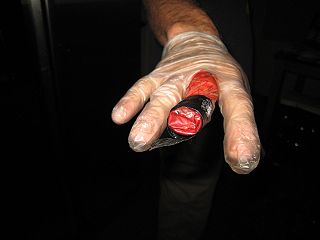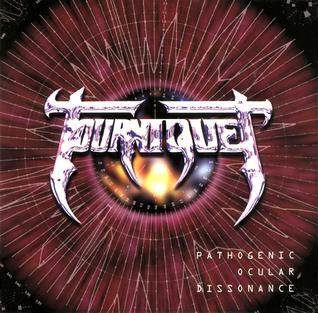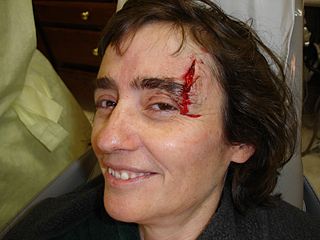
Emergency tourniquets are cuff-like devices designed to stop severe traumatic bleeding before or during transport to a care facility. They are wrapped around the limb, proximal to the site of trauma, and tightened until all blood vessels underneath are occluded. The design and construction of emergency tourniquets allows quick application by first aid responders or the injured persons themselves. Correct use of tourniquet devices has been shown to save lives under austere conditions with comparatively low risk of injury. In field trials, prompt application of emergency tourniquets before the patient goes into shock are associated with higher survival rates than any other scenario where tourniquets were used later or not at all.

Battlefield medicine, also called field surgery and later combat casualty care, is the treatment of wounded combatants and non-combatants in or near an area of combat. Civilian medicine has been greatly advanced by procedures that were first developed to treat the wounds inflicted during combat. With the advent of advanced procedures and medical technology, even polytrauma can be survivable in modern wars. Battlefield medicine is a category of military medicine.

Sehnsucht is the second studio album by German Neue Deutsche Härte band Rammstein. It was released on 22 August 1997 through Motor Music in Europe and Slash Records in the United States. It is the only album entirely in German to be certified platinum by the RIAA in the US. The album peaked at No. 1 on the Austrian and German charts.

In surgery or medical procedure, a ligature consists of a piece of thread (suture) tied around an anatomical structure, usually a blood vessel, another hollow structure or an accessory skin tag to shut it off.

Internal bleeding is a loss of blood from a blood vessel that collects inside the body. Internal bleeding is usually not visible from the outside. It is a serious medical emergency but the extent of severity depends on bleeding rate and location of the bleeding. Severe internal bleeding into the chest, abdomen, retroperitoneal space, pelvis, and thighs can cause hemorrhagic shock or death if proper medical treatment is not received quickly. Internal bleeding is a medical emergency and should be treated immediately by medical professionals.
Stitch, Stitches or Stitched may refer to:
Soul Embraced is an American Christian melodic death metal band from Little Rock, Arkansas. It was originally a side project for Rocky Gray and David Sroczynski.
Blood is a biological fluid found in animals.

Tourniquet was an American Christian metal band that formed in Los Angeles in 1990. The band was founded by Ted Kirkpatrick, Guy Ritter, and Gary Lenaire. Tourniquet primarily performed a mixture of thrash, progressive, and neoclassical metal, and was influenced by additional, non-rock forms of music such as classical and world music. It earned six GMA Dove Award nominations and won multiple recognitions from the readers of HM Magazine, including "Favorite Band of the 1990s" and "Favorite Album of the 1990s" for Pathogenic Ocular Dissonance (1992). The band released ten studio albums, two live albums, four compilation albums, one EP, and several video releases. Tourniquet has sold more than 300,000 albums. In addition to its use of classical music, the band is known for frequently using medical terminology in its album and song titles and lyrics.

Psycho Surgery is the second studio album by the American Christian metal band Tourniquet. It was originally released on Intense Records and Metal Blade Records in 1991. A remastered version was released on Pathogenic Records in 2001 as Psychosurgery and includes revised artwork, an expanded album booklet, and bonus tracks that include live versions of songs featuring then-lead vocalist Luke Easter as well as demos; the title was changed since co-founder and drummer Ted Kirkpatrick always felt that it should have been just one. Retroactive Records released a Collector's Edition remaster on June 26, 2020, retaining the original album title and including an extended booklet as well as different bonus tracks. Considered by critics to be Tourniquet's most balanced of the band's first three albums, Heaven's Metal fanzine ranked Psycho Surgery Christian metal's second-best album of all time.

Pathogenic Ocular Dissonance is the third studio album by the American Christian metal band Tourniquet. It was originally released on Intense Records in 1992 to the Christian market and later released on Metal Blade Records in 1993 to the secular market. It is the last Tourniquet album to feature vocalist Guy Ritter, who left the band after the recording of the album. It was independently re-released on Pathogenic Records in 2001 with digital remastering, two bonus live tracks from the 2000 Dutch Flevo Festival featuring then-lead vocalist Luke Easter, and new cover art. Retroactive Records released a Collector's Edition remaster on June 26, 2020 with the original cover art, an expanded album booklet, and four different bonus tracks. Pathogenic Ocular Dissonance was voted as the "Favorite Album of the 1990s" by readers of HM Magazine. In 2010, HM Magazine ranked it #23 on the Top 100 Christian metal albums of all-time list.

Blood World is the fourth studio album by Australian Christian extreme metal band Mortification, released in 1994. The songs "Your Life", "J.G.S.H." and "Love Song" were included on the Tourniquet/Mortification Collector's Edition CD Single in 1994; the disc also contained a segment discussing Mortification's history, from the video release of Live Planetarium, and material from American Christian metal band Tourniquet's album Vanishing Lessons. Blood World was a commercial hit and the band's most successful album.

"Tourniquet" is song by American rock band Marilyn Manson. It was released as the second major-label single from their second studio album Antichrist Superstar. The image this song conveys is that of the main character in a world of sorrow and self-pity, prior to his transformation into the Little Horn. It was written by frontman Marilyn Manson, co-founder Daisy Berkowitz and longtime bassist and guitarist Twiggy Ramirez. Like many other songs from Antichrist Superstar, the song's lyrics are based on a dream Manson had.

Crawl to China is the fifth studio album by the American Christian metal band Tourniquet. It was initially released on Benson Records in 1997. This album took the band's music style to a more simplistic rock sound. The song "Claustrospelunker" includes bass guitarist Tim Gaines of the American Christian metal band Stryper. The lyrics of the song "The Tell-Tale Heart" are based on Edgar Allan Poe's 1843 short story of the same name. Crawl to China was later remastered by Bill Metoyer and released on Pathogenic Records in 2009; an instrumental version of "If I Was There" was included as a bonus track, the track listing was reordered, new album artwork was made by Rex Zachary, and a new booklet layout was designed with new band photos, lyric commentary, and musical notes. A music video for the title track was released in 1997.

A tourniquet is a device that is used to apply pressure to a limb or extremity in order to stop the flow of blood. It may be used in emergencies, in surgery, or in post-operative rehabilitation.

Emergency bleeding control describes actions that control bleeding from a patient who has suffered a traumatic injury or who has a medical condition that has caused bleeding. Many bleeding control techniques are taught as part of first aid throughout the world, though some more advanced techniques such as tourniquets, are often taught as being reserved for use by health professionals, or as an absolute last resort, to mitigate associated risks, such as potential loss of limbs. To manage bleeding effectively, it is important to be able to readily identify types of wounds and types of bleeding.

Ted Kirkpatrick was an American musician and songwriter, best known for his work with the American Christian thrash metal band Tourniquet. Primarily a drummer, Kirkpatrick was the principal songwriter for the band, and played other instruments as necessary.

Intravenous regional anesthesia (IVRA) or Bier's block anesthesia is an anesthetic technique on the body's extremities where a local anesthetic is injected intravenously and isolated from circulation in a target area. The technique usually involves exsanguination of the target region, which forces blood out of the extremity, followed by the application of pneumatic tourniquets to safely stop blood flow. The anesthetic agent is intravenously introduced into the limb and allowed to diffuse into the surrounding tissue while tourniquets retain the agent within the desired area.
Ischemia-reperfusion (IR) tissue injury is the resultant pathology from a combination of factors, including tissue hypoxia, followed by tissue damage associated with re-oxygenation. IR injury contributes to disease and mortality in a variety of pathologies, including myocardial infarction, ischemic stroke, acute kidney injury, trauma, circulatory arrest, sickle cell disease and sleep apnea. Whether resulting from traumatic vessel disruption, tourniquet application, or shock, the extremity is exposed to an enormous flux in vascular perfusion during a critical period of tissue repair and regeneration. The contribution of this ischemia and subsequent reperfusion on post-traumatic musculoskeletal tissues is unknown; however, it is likely that similar to cardiac and kidney tissue, IR significantly contributes to tissue fibrosis.












